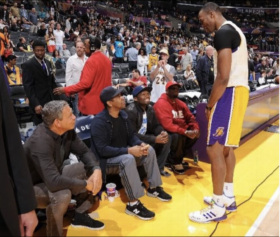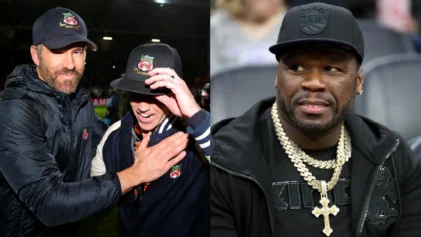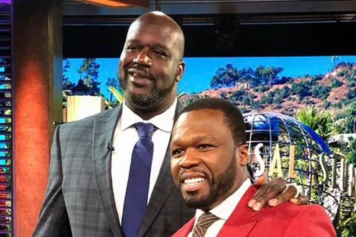Being from Queens, growing up immersed in the infant stages of this explosive hip-hop culture, it was natural for me to write a piece celebrating the life of JMJ, the unlimited boundaries of his musical influence, and how his mere presence symbolized a brighter future for any young African-American kid with a dream and drive. Living in Queens gave you direct access to those larger than life stars plastered on the walls of my bedroom. You might see them at the barbershop with their Pathfinder parked outside. Or the fish spot posted up by their 5-series Beamer.
Run DMC was the first mega act I saw in concert at Brooklyn’s Beacon Theatre back in 1986. My aunt took me to a show featuring them, New Edition and Shannon. And thanks to dudes like JMJ, superstardom was a realistic aspiration in Jamaica, Queens. But love for him wasn't just an around the way thing. Back in the 80s, for kids in places like McCook, Nebraska, Des Moines, Iowa and Jackson, Mississippi; guys like JMJ were superheroes, with images in magazines and on TV screens. His adoration nationwide was massive, but nothing like the love he gets back home.
Queens, NY is one of the original breeding grounds of hip-hop. Its infectious sound penetrates human souls and conquers barriers all over the world. Throughout its history, DJ’s and rappers from the Queens area range in prominence from up-and-coming newbies to legendary pioneers of the game, like Run DMC and Jam Master Jay.
Although JMJ was born in Brooklyn, he moved to Hollis at the age of 10. Adopted as one of Queens’ own, by 13 he was talented enough to DJ on live party sets. And as fate would have it, JMJ met Joseph "Run" Simmons and Darryl "D.M.C." McDaniels after they graduated high school. He agreed to DJ for them because he wanted to be down with a band, any band that could utilize his ability to play various instruments. But he wasn’t just a formidable third leg. In the 2008 documentary 2 Turntables and a Microphone, hip-hop mogul Russell Simmons calls him, “The leader of Run DMC and the Hollis crew.”
Playing the background is something he only did on stage. And even there, his presence was equally felt. On Run-D.M.C's album Raising Hell, JMJ freaked the keyboards, bass, and live drums. “Everybody knew JMJ,” says former Murder Inc. artist and Queens head, Cadillac Tah. “He was the first superstar DJ. He had a talent, technique and flair that was the equivalent of any rapper or singer. The level of his contributions to the overall success of Run DMC is often ignored. But in his death, he’s still getting his deserved props.”
Anyone who resides in the borough, particularly the South Jamaica area, (which encompasses Hollis, Queens, home of Run DMC) feels an intense sense of pride and superiority largely because of the mind-blowing, music-bumpin’ exploits of Rap’s first crossover group —and its DJ — who revolutionized the art of the turntable. JMJ was unique and ahead of his time in the way he freaked loops, bounced beats, and attacked his musical arrangements to include the raw effects of the scratch.
“The DJ has always been the most important component in this culture/art of Hip-Hop.” says Queens, NY's own, Phife Dawg, from A Tribe Called Quest, in an interview from his home in Oakland, CA. “JMJ, hands down, has to be one of the most important DJs to have ever done it. He introduced me to Adidas Suits, Shell-toes with no laces, embracing and loving my borough of Queens at the time when Queens’ 'street essence' and hip-hop culture was slept on. Because of legends like him, Queens reps at least 75-80 percent of the hottest MC’s and groups to put it down in rap history."
JMJ could have set up shop anywhere in the world. If he wanted to keep it close, he could've picked some luxury apartment building in Westchester, NY, or a mansion in Teaneck, New Jersey. Instead, he stayed close to the shifty streets of Queens and selflessly partnered with entrepreneur and music enthusiast Rob Principe to launch Scratch Music Group, which led to the opening of the Scratch DJ Academy in Manhattan. With other locations in Los Angeles and Miami, the school offers aspiring turntable-rockers a clear and tangible path to becoming a successful DJ.
Personally knowing some who are close with JMJ’s family, the best way to really bring this story to life was to speak with the Mizell family. Maybe his mom Connie, or son Jason Jr., who’s following in his father’s path as a true party-rocker. JMJ’s big brother, Marvin Thompson (one of Jay’s biggest supporters and early motivators), is CEO of the Jam Master Jay Foundation For Youth Inc, which is a non-profit organization that, according to its website, does back to school events, toy drives, and turkey giveaways on the holidays. The Foundation is also involved with various scholarship funds and promoting educational initiatives for youth.
However, due to a technical error with the link to the site, I was unable to access any information on its Cash 4 College Scholarship Fund. Listed as a $2 million dollar-a-year project that makes a college education more affordable for youth, the project provides $2,000 in college tuition to 1,000 freshman students from across the U.S., along with a free laptop computer, and a second year of financial support for students who maintain or raise their G.P.A. during their first year in the program.
I wanted to highlight this and show support. But I haven’t been able to find any information on how many recipients the award has had or the names and success rates of the students involved.
To freak this story, I needed more than a website, and was elated when a mutual friend told me he set up an interview with Marvin, JMJ’s brother. After calling, I was sent to an answering machine for the JMJ Foundation. And a couple minutes later, after receiving my message, a lady named Kimba Reynolds called me back. Reynolds explained that she was the Chief Operating Officer. She said the family gets a lot of interview requests this time of year and they rarely do any during the month of JMJ’s death. But still, she’d send my request to Marvin and he would call me back as long as this wasn’t some kind of death conspiracy theory piece, “because it’s intrusive and disrespectful to the family in their time of mourning," she said.
I totally understood and assured her that the piece was a super fluffy, borderline worship story. The call ended nicely. But after not hearing back from Reynolds, and being assured from a mutual friend that Marvin was home all day and waiting for my call, I tried again two days later. And Reynolds returned it, informing me that Marvin knew I reached out and the interview shouldn’t be a problem. But as she continued, her words weren't what I was expecting. "When you find a $200 donation then we’ll be glad to do the interview,” she said.
I was taken aback, because in all my years of reporting, I have never been charged to help promote someone else’s business. And I definitely don't and won't buy quotes. Besides, even if The Shadow League agreed to “donate” $200 to speak with a member of JMJ’s family, it would only have happened if, according to Reynolds, the funds were secured in advance.
To me, she was asking a lot. My desire to do a thorough, celebratory piece on a musical legend had turned into a funds soliciting campaign, with the true objective lost in the financial sauce. Reynolds explained to me that when TV stations and print publications want an interview with JMJ’s family, the foundation usually requires a donation of at least $200. “No one else has a problem with it," she said. "So why do you?”
Needless to say, I was tight.
There are other, more tasteful ways to get contributions. And around this time of year, yes some news outlets may be looking for a come-up. But JMJ didn’t treat his fans and media like leeches. So why should his foundation spin that vibe? I proceeded to call my contact, who Reynolds claimed she “didn’t know,” and broke down the situation.
A few hours later, she called me back. “Are you going around telling people, we are charging for interviews?” She asked this in a tone that reminded me of the days my mother used to catch my cousin and I sneaking funny cigarettes in the garage. “We’re getting calls that someone is going around saying we are charging people.”
We exchanged pleasantries about the technical definition of a donation and the functions of a not-for-profit, which I was familiar with because my mom ran one of the top youth-based not-for-profits in U.S. history. But still, the call ended in the negative. She told me the family has a right to deny any interview and she was denying mine.
This all is contrary to Jason Mizell's personality. He's celebrated in my hood for how well he treated folks and never forgot where he came from. JMJ didn’t run from his beginnings because he comes from a unique place that’s as equally uplifting and bursting with intelligence, talent and hope as it is riddled with crime, poverty and drug use. That’s the beautifully twisted duality of living in Queens. It birthed the glorious collage of musical moments JMJ experienced in life, and set the scene for the gutter tragedy of his violent death at age 37. I wanted to do his memory justice at a time when his legacy’s spotlight is shared and scarred by the anniversary of his foul assassination on Oct. 30th, 2002.
It’s been 11 years since Jason Mizell was gunned down in his studio on Merrick Boulevard in “South Suicide” Queens. The loss was tremendous for hip-hop and the Queens community that anointed him a King of Rock.
As the story goes, the night of his death, Jam Master Jay was visited by a longtime pal and business partner. Afterwards, two friends came in, shut themselves in the control room at the front of the studio, and were only there for less than an hour before a man, dressed in black, possibly wearing a hat, stepped inside. After giving JMJ a hug, at about 7:30 p.m. this man pulled out a .40-caliber handgun and shot JMJ dead. The killer and his accomplice, who was standing outside the door, both sprinted out of the two-story building and disappeared.
Jam Master Jay’s murder is still a mystery more than a decade later. According to nydailynews.com, law enforcement sources, who at one time worked the case, said the people inside Mizell’s 24/7 recording studio gave a play-by-play account of the murder — but nobody was giving up a positive I.D. of the shooter.
“We never really had a good lead,” the case’s head detective, Vincent Santangelo told the Daily News. “Nobody would or nobody could tell us the who or what. We’re still looking for that person.”
In 2003, through hood rumblings and police investigation, Kenneth "Supreme" McGriff, a convicted drug dealer and longtime friend of Murder Inc. founders Irv and Chris Gotti, was investigated for targeting Mizell because the DJ had defied an industry blacklist by working with rapper 50 Cent who'd been blacklisted because of his song "Ghetto Qu'ran." This single apparently was seen as “snitching” on McGriff's drug history.
In April 2007, federal prosecutors named Ronald "Tenad" Washington as an accomplice in the murder. He’s also a suspect in the 1995 murder of Randy "Stretch" Walker, a former friend of the late Tupac, who was also assassinated. According to court papers filed by the prosecution, Washington “pointed his gun at those present in the studio, ordered them to get on the ground, and provided cover for his associate to shoot and kill Jason Mizell.” However, he was never convicted and no new suspects have been named.
New York in general, is still feeling JMJ’s loss. In my opinion, 50 Cent is the last Queens artist to really own hip-hop. While JMJ was the first cat bold and real enough to give him a shot, the game become twisted and corny afterwards. Let’s hope the team handling JMJ’s foundation continues to represent their initiatives with the same class and fearless optimism that everyone’s favorite DJ did. He led with his heart and an understanding of everyone’s value. He saw potential in most people because he was living proof that miracles do come true in a world that needs more healing spirits and musical geniuses. JMJ was both. And his legacy is in our hands now. God damn, that DJ made my day.



